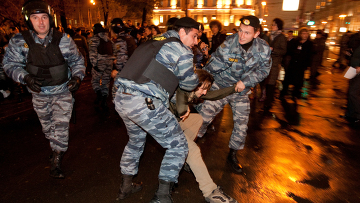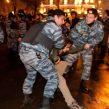
Local Court Rules Against United Russia Electoral Victory in Dagestani City
Publication: Eurasia Daily Monitor Volume: 6 Issue: 223
By:

On December 3, the Derbent city court in Dagestan annulled the mayoral elections that took place on October 11. The decision was astonishing news, given that Felix Kaziahmedov the incumbent mayor of Derbent and a member of the pro-Kremlin United Russia party, had been announced the winner (www.kavkaz-uzel.ru, December 3).
The October 2009 elections in Derbent were considered to be among the most fraudulent elections in Russia in the past several years. Of the 39 polling stations in the city, 13 did not open at all and three worked only part time on election day due to pressure from the government authorities. For the first time in Russia’s recent history, voters at some polling stations were openly prevented from casting their votes by the government, and at least one head of a polling station was kidnapped. The Derbent city court reportedly listened to 200 witnesses, who testified about multiple irregularities during the elections. Even though the Dagestani authorities proclaimed Kaziahmedov the winner and he was given a hasty inauguration and protected by police from court bailiffs, the court decision casts doubts on his ability to hold on to power (www.gazeta.ru, December 3, www.kommersant.ru, December 4).
Russian courts do not normally challenge United Russia’s victories, given that the country’s judiciary is highly dependent on the executive branch and can easily be influenced by it. Also, the results of elections are generally very rarely contested to the extent of being overturned by the courts. This is also the first known annulment of the results of a popular vote in the North Caucasus, where elections are habitually and manifestly rigged to provide results that would suit the current inhabitant of the Kremlin and his local loyalists.
Two principal candidates contested the Derbent mayor’s position –incumbent mayor Felix Kaziahmedov, a protégé of Dagestan’s President Mukhu Aliev, and Imam Yaraliev, the head of the Suleiman-Stalsky district of Dagestan and the former prosecutor-general of the republic. The results of the Derbent election provoked protests as far away as Moscow (EDM, October 30).
Derbent, which is Dagestan’s third largest city, with a population of just over 100,000, is situated in the south of the republic near the Azeri-Russian border. The struggle for the mayoral position was seen as part of a bigger fight between President Mukhu Aliev, who backed the incumbent mayor, and Aliev’s numerous and powerful opponents. Aliev’s presidential term ends at the beginning of 2010 and several strong candidates have ambitions to replace him. Given the latest court ruling, local elections in this Dagestani city may have even wider implications than was previously assumed.
The Gazeta.ru website noted that the results of the elections are normally overturned if the winning candidate was not a member of the ruling United Russia party, but until now there had been no case in which a non-member of United Russia successfully overturned the results of an election in court (www.gazeta.ru, December 3). Now, many unhappy opposition leaders across Russia might potentially be emboldened and heartened enough to demand fair election results, if not in the past cases, at least in the future.
Some Moscow experts like Alexander Kynev claim that the Kremlin could not tolerate the rampant deception in the Derbent elections and intervened through the judicial system (www.kommersant.ru, December 4). But probably equally, or even more important, was the forceful stance that the opposition leaders and their supporters took after the voting was rigged. In an interview with Kommersant on October 14, Imam Yaraliev was asked whether his supporters would stage public protest actions. He responded: “I have asked and will ask again our supporters to act according to the legal regulations. But it is hard for me to predict what people will do. They say: ‘If the authorities behave worse than bandits, how can we stay within the legal framework?’ And I hope that the president that allowed this [falsified election] to happen will soon not be in our republic.” In the same interview, Yaraliev complained that no federal representatives had expressed a wish to meet with him and that the federal authorities had received all their information from the authorities in Dagestan.
Moscow’s attitude to the latest developments surrounding the elections in Derbent may partially be reflected in the fact that –at least as of early December 4– the major Russian news agencies like RIA Novosti, ITAR-TASS and Interfax had ignored the milestone decision of the Derbent city court. This may indicate Moscow’s temporary shock and indecisiveness over what to do next.
A legal and political fight appears to be still ahead, given that United Russia or the prosecutor’s office is likely to protest against the decision of the Derbent city court. However, Moscow will be put in a tricky situation if it is eventually asked to decide the case. On the one hand, Moscow will not want to set a precedent whereby an opposition leader can abolish an election. On the other hand, if Moscow upholds the results of a manifestly unfair election, it will further alienate the already very much alienated Dagestani population and tie itself to supporting President Aliev. Essentially, this will mean that Moscow is attempting to foster a political evolution of Dagestan along the same lines of Kadyrov’s Chechnya, where the ruler can increasingly do anything he wants to, provided he delivers outward loyalty and the desired electoral results.




